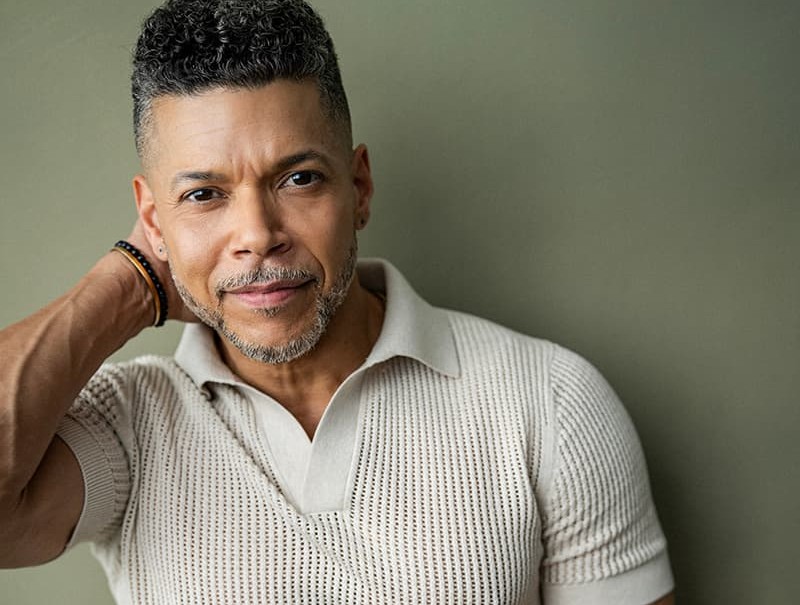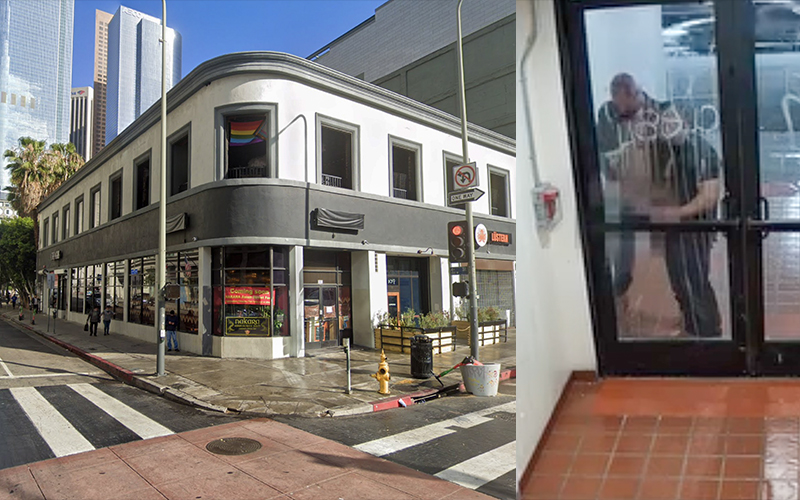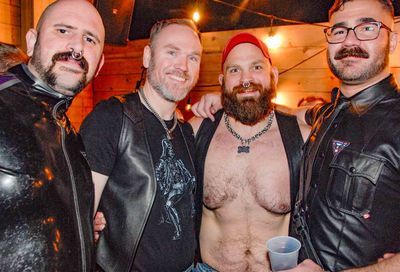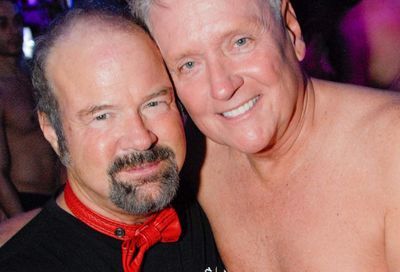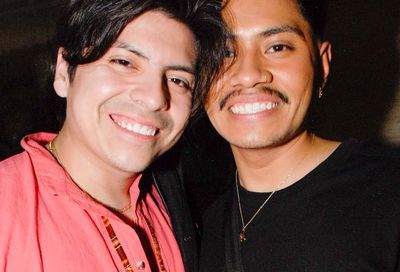Conrad Ricamora steps into the spotlight in Signature’s “Simply Sondheim”
The LGBTQ actor talks about his time on How to Get Away with Murder and why he'd like to see more roles for both gay and Asian-American actors.

Audiences craving the all-too-distant thrill of live musical theater should lose their minds over Signature’s new production of Simply Sondheim. Filmed over three days on the company’s Max main stage, without an audience, the theatrical concert transcends the bounds of its digital presentation to capture the genuine feeling of a live event.
Blazing through a spirited revue of over 30 Sondheim songs, the 16-piece orchestra and 12 talented singers performing director-choreographer Matthew Gardiner’s production transmit such excitement, perhaps because they too have been missing that live thrill. Certainly, one of the show’s stars, Conrad Ricamora, of Broadway’s The King and I and TV’s How to Get Away with Murder, agrees it was great to be back on stage after many months of dark houses.
“I will never again take for granted what it means to go to the theater, to work in the theater, especially after this last year,” says Ricamora. “I mean, we all complain about doing eight shows a week. I don’t think I will ever complain about it again, because this has made me miss it so much.”
The show’s impressive cast — including Tony nominees Norm Lewis and Emily Skinner, and Signature favorites Tracy Lynn Olivera, Awa Sal Secka, and Bobby Smith — channel their palpable excitement through the joys and tension of Sondheim’s songs, which hold a special place for Ricamora.
“I feel like they’re so story- and character-driven, and that’s what I love about them,” he says. “They’re actually really perfect for actors who come at it from an acting standpoint because the lyrics and the melody give you everything that you need to approach it. And I think more so than a lot of contemporary musical theater writers who are just writing towards that big belt, this is actually taking you on an emotional, character-based journey.”
Ricamora’s own adventurous journey has taken the gay, California-born, Florida-raised actor and writer from playing competitive tennis in his youth, to earning an undergraduate degree in Psychology, before getting his M.F.A. Eventually turning his focus to acting, he broke through with an acclaimed performance in David Byrne and Fatboy Slim’s Off-Broadway rock musical Here Lies Love.
Soon, he’d be cast on ABC’s Viola Davis-starring hit How to Get Away with Murder, as good-natured gay hacker Oliver, in love with the driven, occasionally ruthless Connor, played by Jack Falahee. Ricamora’s impact as a queer activist, and as half of one of network TV’s most prominent LGBTQ couples, known to fans as “Coliver,” earned him a Visibility Award from the Human Rights Campaign.
Onstage, he continued to gain visibility with roles in the Tony-winning 2015 revival of The King and I, and in David Henry Hwang and Jeanine Tesori’s original musical Soft Power, both of which garnered him Grammy nominations for his work on the cast albums. And among the Simply Sondheim cast, Ricamora hits a particular highlight in his performance of “Finishing the Hat” from Sunday in the Park with George, an artist’s lament that the performer understands deeply.
“I’ve had a really hard time in my personal life connecting in a way that felt real with friends and family and even intimate relationships,” he says. “But through the arts, I have felt that connection more intensely and more consistently than in my personal relationships. So I get why this character in ‘Finishing the Hat’ is obsessive about his painting, because he does feel a human connection in a way that he doesn’t feel in his real life, with lovers who don’t understand why he’s obsessed about what he’s doing and then ultimately leave him.
“Sondheim paints that picture so well through his lyrics. I think he gives you everything that you need in the same way that when you approach Shakespeare, Shakespeare gives you everything that you need to dive into the character.”

METRO WEEKLY: Let’s start with Simply Sondheim. I don’t know if you’ve seen it, but my first thought is that I wish you were in it more.
CONRAD RICAMORA: Well, thank you. I guess that’s better than the opposite of, “Oh, you were in it way too much.”
MW: Have you done many other virtual performances during this weird time?
RICAMORA: No, for me it’s hard. I agreed to do this one because we were in the theater with musicians and other actors in the same space. For me, the thing I love most about theater is the communal aspect of it. Whenever I’ve thought about doing virtual stuff — and I hate to say this, because I know a lot of people are doing it — but for me personally, it just depresses me and bums me out. I’ve taken this time to kind of step back and be a little bit quieter on the theater scene, because the thing I love about it is that you’re breathing the same air as your fellow actors and crew and audience members.
MW: Watching this performance, about half a dozen songs in, I was like, “Oh my God, I miss this experience.” Partly, it’s because those are performers that I would have seen several times in the past year and I hadn’t seen them once. What are you missing most from the performer side?
RICAMORA: In a theater, you go to really intense places with an audience, with your fellow actors, with the playwright who’s crystallized these human truths, and we all get to experience them. And even the act of going to see a show and then grabbing a drink with your friend afterwards to talk about the show, or to just decompress and debrief what you thought about the show or what your friend thought about the show — that is such an important part of our human experience. And I think it was taken for granted by a lot of people in a way that when it comes back, it’s not going to be taken for granted. Hopefully there’s going to be this explosion of theater arts when we’re all able to be in the same space again.
MW: In a revue format, you’re taking moments out of context, so what’s the key for finding a character in one song?
RICAMORA: I feel like every song is presented as an “I want” moment or an “I need” moment for a character. And it’s just so clearly laid out how this man in “Finishing the Hat,” even out of the context of the show, tells a story all on its own. There’s a beginning, a middle, and an end to where he’s frustrated at the beginning, trying to figure it out in the middle, and then he realizes what he’s lost and what he’s gained in how he’s lived his life. That takes place in the whole song. Especially in a revue where you’re not necessarily following the story of Sunday in the Park with George, you see what the story is with that snippet. And I tell that story.
MW: One of my favorites and probably many people’s favorite Sondheim, “The Ladies Who Lunch,” is in there, and Emily Skinner really kills that performance. Do you have favorite Sondheim songs that are not in this show?
RICAMORA: Oh, I love “Johanna” from Sweeney Todd. I mean, honestly my favorite Sondheim song is in the show — that Norm Lewis kills — “Being Alive” [from Company]. That’s my favorite of all time, and again, it also deals with somebody who’s having a hard time connecting with personal relationships. But if I had to pick one that wasn’t in, I would say “Johanna.”
MW: Do you have a sort of Sondheim Mt. Everest role that you dream of playing?
RICAMORA: I would love to play George in Sunday in the Park, or Bobby in Company.
MW: I was reading about Soft Power, I watched some performances on YouTube, and I feel like a lot of people haven’t seen it. What is that show about?
RICAMORA: Oh, my gosh, there’s a lot of themes in it. It is about the 2016 election between Hillary Clinton and Donald Trump, and it takes a reverse King and I spin on what if Hillary was like the King-type figure. I play a Chinese film executive who comes in and is sort of like the Mrs. Anna of the show, and how would China tell the story of America maybe 100 years from now, when China has become like the dominant superpower. How would they review United States history? The same way that Rodgers and Hammerstein with King and I painted the picture that Siam, or Thailand, was full of barbarians in their production and kind of examining in what ways are we barbaric. And I think that we’ve found there are a lot of ways that we are barbaric in our own country, and yet we have so many tropes of a white savior that comes into a foreign country and just kind of gets everyone in shape and holds the moral high ground above everyone else. So, it deals with that.
It was written by David Henry Hwang. He was stabbed in the neck while walking home from the grocery store in Brooklyn around the time of the 2016 election and we get into that fever dream of reverse King and I after he is stabbed. They didn’t find who stabbed him, but after an investigation, police could only reason that it was probably because they thought he was a Chinese delivery man, and it was a hate crime type of attack, because they didn’t rob him. They didn’t do anything, they just stabbed him. That’s kind of what it’s about. It deals with the precariousness of democracy and what we think of as freedom in this country. Are we really free or do we have something to learn from the way China rules their land and their people? It asks a lot of questions, and I love it because it’s really challenging for the audience. It doesn’t give you a clean-cut, “This is the right way, America is the best.” It also doesn’t say that China is the best, it just poses a lot of questions and asks you to sit with them, and most of the time it’s really uncomfortable for the audience.
MW: I was unaware that David Hwang had been attacked, but I am aware of hate crimes and attacks against Asians and people of Asian descent being an issue. I was going to ask if you were aware of the campaign that was being led by Daniel Dae Kim and Daniel Wu, among other actors, raising awareness through specifically offering a reward for the capture of a suspect who was attacking people around San Francisco?
RICAMORA: No. I’ve kind of taken a little bit of a social media break, so I haven’t read any of this stuff.

MW: They caught the suspect. But it brings attention to this issue, which was exacerbated by actions of the previous administration, the rise in discrimination against Asians and people of Asian descent. Have you seen or experienced anything like this?
RICAMORA: No, but when we first entered lockdown a year ago almost, when Trump started calling [COVID] the “China virus,” and people were yelling around the slur “Kung flu,” I started being a little bit nervous to go to the grocery store. I started wearing sunglasses because I didn’t want people to see the shape of my eyes, because I thought that would make me a target.
MW: I understand totally where you’re coming from about adjusting your behavior or appearance in consideration of other people’s problematic thinking.
RICAMORA: Yeah, yeah. No fun.
MW: No, it isn’t. Soft Power seems to satirize everything that we might consider dated or problematic about The King and I. Obviously, you performed quite successfully in The King and I. What is your feeling about doing both of these shows, and the points that one is making about the other?
RICAMORA: I mean, I first would want to say that as an Asian-American male actor in the United States, I have had to take roles because there was literally nothing else available. Our stories were not being told in a three-dimensional way by other Asian-Americans, and I wanted to be an actor. All of those roles helped me develop a craft and helped me get to where I am, but now I’m hoping to shift the narrative by taking different roles, like Soft Power, and shining a light on the need for us to see ourselves in a three-dimensional way. I’m not saying we need to be shown as perfect human beings. We can still be villains, we can still be awful people, but we can’t be caricatures, we can’t be stereotypes, we have to be three-dimensional. When people write us as characters, they have to show what ticks in us and not just be used as a device. For Asian-American men, it’s mostly been a comedic device.
So, yeah, it’s been a complicated journey, but I think that every minority in this country has to navigate a really complicated set of norms that they’re born into and hopefully just move the dial a little bit — correct it a tiny, tiny bit — so that it’s better for the next person coming behind you. I didn’t start out as a writer in the arts, I started out as an actor, and the text that was given to me was written in a not so three-dimensional, not so fulfilling way. I’m happy that I hung in there through those types of shows, and The King and I is flawed, but it’s not completely without some merits. The production that we did at Lincoln Center was flawed, but I still think it had a lot of merit, and again, I was in that show with Ruthie Ann Miles and Ashley Park, who are huge stars now. And we have to navigate the world that we’re born into before we can make change in the world.
MW: Another great thing about Soft Power is that you are currently a Grammy nominee for the cast album. And this year there’s no Hamilton-size juggernaut in the race, so who knows?
RICAMORA: David Byrne’s in there and he’s got a lot of friends in the recording industry who are probably going to vote for him.
MW: What’s your perspective in general on winning or not winning awards?
RICAMORA: I mean, listen, the first time that I ever got a bad review, I was doing Romeo and Juliet in Philadelphia in 2006 — and I worked so hard. I work so hard on everything that I do just to justify the characters and justify what I’m doing either on stage or on screen, and to hang your hat or to hang any of your anticipation on awards or reviews, positive or negative, just takes away so much of the joy of the process for me that I stopped caring about that a really, really, really long time ago.
MW: That’s a good attitude.
RICAMORA: Yeah, it’s no way to live your life.
MW: Speaking of awards and accolades, though, have you seen Viola Davis in Ma Rainey’s Black Bottom?
RICAMORA: Oh my God, yes! I mean, when she chugs that Coke?
MW: That’s a great moment.
RICAMORA: I mean, her abilities as an actor will forever blow me away and I’ve never seen her do anything like what she did in Ma Rainey. I mean, she has such a presence as that character. I was blown away.

MW: What do you miss most about doing How to Get Away with Murder?
RICAMORA: I miss the people. I miss the crew after six years because we had like the same camera crew, a lot of the same [assistant directors]. I miss playing such a groundbreaking couple that was a biracial couple and an LGBTQ couple on Primetime TV. It was so interesting to read that, for the first time in a few years, GLAAD reported that there was a dip in LGBTQ representation on TV, and I was like, “Oh, that’s interesting because our show just went off the air.” We had a lot of representation on that show.
MW: Inquiring minds will want to know when is the last time you saw or talked to your Connor, Jack Falahee?
RICAMORA: Oh, we text all the time.
MW: Because the “Coliver” couple was such a visible representation of queer characters, was anybody from the show or the network taking you guys aside before interviews to say, “Well, here is what the party line is?”
RICAMORA: No, they always gave us notes on how to speak about the episodes, because Shondaland is built on the “OMG” moments, so you can’t spoil anything. So that was all the guidelines that they gave us before interviews. Or like, “You can say this, but don’t say this,” and what you can say about plot and storyline.
MW: One thing about watching you and Falahee together is you have great chemistry. It doesn’t really matter that one actor is straight, one actor is gay, but obviously it could be fodder for this debate people are having about balancing representation of the actors playing the roles with what the roles actually are. Saying gay characters played by gay actors. What do you think is the way to balance that?
RICAMORA: Well, I think a good start would be to hire more gay actors to play straight roles, not just pigeonhole them for gay characters. I mean, I’ll be happy to tell LGBTQ stories for the rest of my life just because I watch those shows, I watch for those characters in shows, and I will start following a show if one of the lead characters is an LGBTQ character.
But it’s tricky. There definitely is an imbalance and there definitely still is that Hollywood machine that wants to only make stars out of specifically straight white men. I mean, the fact that there are five — I think five — white Chrises that are A-list actors in Hollywood and I can’t think of one genuine, true, A-list Asian male movie star actor. That comes through casting. That’s not just because, “Oh, well, they haven’t worked hard enough.” No, it’s the people that are making those decisions who have to start putting Asian faces on bigger projects. The ability is there, the talent is there, it’s just the Hollywood machinery isn’t taking as many chances.
It feels like it might be changing, especially with Crazy Rich Asians showing that it can translate into box office success, because people are going to listen when money talks. So things like that and Parasite showing that like, “Oh, other people can watch an Asian person go through a story and connect with them emotionally.” It seems so simple, but I feel like the Hollywood system is so crusty.
MW: Most recently you appeared on FOX’s The Resident. Are you going to be returning on that show?
RICAMORA: I come back on episode six of this season, either next week or the week after that, and then I’m on pretty much for the rest of the season.
MW: Is your character straight or gay?
RICAMORA: He’s gay. But again, for me, it doesn’t matter to me because I feel like, gay or straight, human beings can connect with a story no matter what it’s dressed as. I like when RuPaul says we’re all in drag.
MW: Oh, absolutely. “We’re all born naked and the rest is drag.”
RICAMORA: Yeah, we’re naked and the rest is drag. So I’m shooting that until April, and then I’ve written a show with two of my friends called No Rice that’s about three gay Asian men — three gaysians — in New York City seeking love, sex, and acceptance in a white man’s world.
MW: Are your co-writers performers that I would know?
RICAMORA: Kelvin Moon Loh who did Beetlejuice, which came to D.C. He was Otho in that. And Jeigh Madjus who is in Moulin Rouge! on Broadway, and hopefully that’ll open back up sometime in the next couple of months.
MW: Of course, we have a gaysian pioneer on SNL, Bowen Yang.
RICAMORA: Yes, oh my God! I love him so, so much. He is so brilliant. I have not been excited by watching someone in a really long time the way I’m excited about him. He’s honestly my favorite part of SNL right now.
MW: So maybe he’ll find his way into No Rice somehow.
RICAMORA: I would die for that to happen.
MW: Now also, among other things, you are about to celebrate your birthday. How will this year be different from what it was last year, which was before the pandemic?
RICAMORA: Oh yeah, last year I went to Disneyland with a bunch of friends right before the pandemic hit, and there will be none of that this year. I’m a huge tennis fan, so I’ll be watching the Australian Open. I’ve still been watching it right now.
MW: Awesome. I’ll be watching it, too.
RICAMORA: Serena’s outfit. Oh my God, I was gagging.
MW: Do you think we’re going to see a male professional player come out? What are they waiting for?
RICAMORA: I know I’ve heard, when I’ve read books and interviews from people who have come out after their careers are done, that there are definitely gay men on the tour. But they’re just not coming out, I guess, for fear of losing sponsorships, or I don’t know. I sympathize with them because I grew up playing tennis pretty competitively, and anytime there’s a sports atmosphere, that machismo culture is so amplified. So I sympathize with them, but I also secretly am just like, “Come on, you can do it.” It’ll change so much if there is just one active player that will take that chance to come out.
Signature’s Simply Sondheim is available on Marquee TV for streaming on-demand through March 26. Tickets for a 72-hour viewing window are $35. Visit www.sigtheatre.org.
All six seasons of How to Get Away with Murder are streaming on Netflix. Visit www.netflix.com.
Read More:
Signature’s sublime ‘Simply Sondheim’ is as impactful as it is enjoyable
Jonathan Capehart: The New Face of Sunday Morning
Task Force’s new leader Kierra Johnson on the future of the LGBTQ movement
Support Metro Weekly’s Journalism
These are challenging times for news organizations. And yet it’s crucial we stay active and provide vital resources and information to both our local readers and the world. So won’t you please take a moment and consider supporting Metro Weekly with a membership? For as little as $5 a month, you can help ensure Metro Weekly magazine and MetroWeekly.com remain free, viable resources as we provide the best, most diverse, culturally-resonant LGBTQ coverage in both the D.C. region and around the world. Memberships come with exclusive perks and discounts, your own personal digital delivery of each week’s magazine (and an archive), access to our Member's Lounge when it launches this fall, and exclusive members-only items like Metro Weekly Membership Mugs and Tote Bags! Check out all our membership levels here and please join us today!





